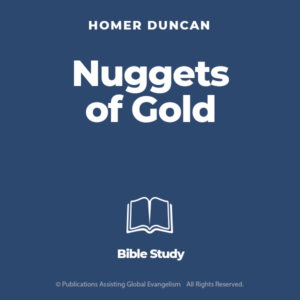Bible Study
WHY I BELIEVE THE BIBLE
By M.H. Duncan, B.A., M.A. (Yale)
Mr. Duncan was formerly a fellow in Political Science at Yale University and served as Superintendent of Public Schools for many years.
More than 253,000 in print
Copyright @ 1972 By Missionary Crusader, Inc.
FOREWORD
This booklet was first published as a serial in the Western Recorder, Louisville, Ky. The editor of that paper said:
“The thoughtful reader will see that Mr. Duncan has dealt with his great theme in a way at once edifying to the student and to the general reader. The primary purpose of his intended pamphlet is to reach young men and women who in their college work today are confronted with more agnostic theories than perhaps any group of students ever before had to meet. In serving that purpose he has achieved that rare result – a work on Christian apologetics helpful both to the theological expert and to the average man. The pamphlet is greatly needed. Scholarly in its background and survey, it is pointed and intelligible in its method.”
WHY I BELIEVE THE BIBLE
The Bible is the basis of all true learning. There is no safe educational philosophy not built upon its fundamental teachings. The new education of today is beginning to turn its attention to character building as the supreme aim of its work, but it will not go far in this direction until it finds that there is no basis for character except that pointed out in the Bible. Faith in the Bible is the greatest asset of any y o u n g man or woman. The saddest fact in all the world is that so many of our teachers sneer at the Book, and constantly, by word or look, teach that which will destroy that faith. It is to counteract such teaching and to help the young men and women in our high schools and colleges in their struggle with disbelief that this booklet has been written. The writer wants these young men and women to know that the Bible has stood in the light of the keenest criticism for nearly two thousand years and has not been convicted of a single error. He wants them to know that it is the most wonderful book in all the world and that its plain teachings will enable them to live the happiest and most successful lives, and, in the end, give them a sure basis upon which to meet their God in eternity.
I believe the Bible because it gives every evidence of being a supernatural book. It is not like any other book in its claims, in its message, in its moral tone, in its insight into human nature, in the comfort of its words, or in the peace it brings to the hearts of those who believe it. It is a unique book, standing among the millions of other books, in a class by itself. Other books may be classified as to their subject matter, their language, the accuracy of their message, but the Bible stands by itself in a distinct class, not fitting into any merely human classification of books. The uniqueness of the book together with its marvelous message and the wonders of its structure are more than enough to convince me that it is not humanly written and that only God could have been its author. It is my purpose in this booklet to point out some of the marvels of the Book and to indicate a few of the many respects in which it stands in a class by itself, thus showing that it could not have had a human origin.
ITS AUTHORSHIP
The Bible is composed of sixty-six books, written over a period of more than fifteen hundred years, by more than forty different authors who lived in many different walks and stations of life; yet there is one central message that runs throughout. It was written by kings, by princes, by statesmen, by men of science, by herdsmen, by shepherds, by fishermen, by men of learning, by men without learning, by men in every condition of life, and yet, in spite of the fact that the scholarship of every age has subjected it to the most searching criticism, not one flaw has been found in its make-up from the first page to the last. It is true that, as the light of scholarship has fallen on its pages, men have imagined that they have found inaccuracies in its statements, but, as further light has been turned on, these seeming inaccuracies have one after another faded away, so that the Book stands today in the light of the most searching historical research without a single scar. The seeming inaccuracies have in every case been on the surface and have been such when their full meaning was known, as to prove the harmony of the whole. In the light of modern scholarship, only the uninformed will refuse to admit that the Bible is both scientifically and historically accurate.
This to me is marvelous. It is beyond reason to believe that more than forty different authors living over a period of fifteen hundred years in many walks and conditions of life could have written a book with one message without a contradiction or misstatement. No forty men, even in this enlightened age, could write a book with a common message, as did the authors of the Bible. If this be true with the accumulated learning of the ages at their command, how much more would it have been impossible in the days when the Bible was written, and still more impossible for men scattered over fifteen centuries and from the highest as well as the lowest walks of life, to do such a thing.
It must be remembered, too, that the writers of the Bible did not have opportunity to know the thought of the age in which they lived, as we can know it today with our many means of communication. Each one lived in his own sphere and many of them did not know what the others had written. It is thus out of the bounds of reason to believe that the Book is a product of human effort, and we are forced to the conclusion that God must have been its author.
Another marvel is that the Bible gives a progressive revelation of the message it would convey. It begins with the simple teachings of Genesis, simple on the surface, and goes to a fuller and fuller revelation of its meaning until all its fullness is revealed in the book of Revelation. The Book thus gives every evidence of being the product of one mind, for no multiple mind could lead the student from revelation to revelation, step by step, to a climax, as the Bible does from Genesis to Revelation. Such a progressive unfolding of truth as we find in the Bible is clearly the work of one mastermind.
It is marvelous that we have as writers of the Bible, Moses, the prince, brought up with all the advantages of royalty, with all the learning of the Egyptians; David, the king, with limited advantages of human instruction; Isaiah, the scholar of Israel; Ezekiel, the priest; Amos, the herdsman; Luke, the physician; Matthew, the tax-gatherer; Peter, the fisherman; and Paul, the learned Pharisee, with all the advantages of the schools of his day; all bringing to us the same message, but each message unlike the message of the other. Could such a book have been written without the direction of an eye that could see further than any human eye or a power that is beyond that of man?
THE BOOK CLAIMS A SUPERNATURAL ORIGIN
The Bible claims a supernatural origin in a way that is true of no other book. Over twenty-five hundred times in the Book we have such expressions as, “Thus saith the Lord,” “The Lord spoke to Moses,” and “The Word of the Lord came unto me, saying.” The Book distinctly claims that “All Scripture is given by inspiration of God” (2 Timothy 3:16). It claims to be a “Sure word of prophecy,” (2 Peter 1:19) and plainly says that “no prophecy was ever made by an act of human will, but men moved by the Holy Spirit spoke from God” (2 Peter 1:21). No one can read the Bible without being impressed with its claims of divine inspiration, and no one can deny that it claims to be more than a book from the human mind.
The claims of the Bible are such as to make it impossible for us to take a middle ground. We must either accept it for what it claims to be or cast it aside as unworthy of our confidence. If the Bible is not from God, it is a cheat and a fraud, and is, in no sense, a worthy standard of morals. We can not say that it is not all it claims to be and yet a good book. If it is not what it claims to be, it is a deceiver, an imposter, and is wholly unfit to be offered as a standard of conduct.
But the Bible does not talk like a deceiver. It shows sincerity on its every page. Even its enemies will admit that no book in all the history of man has had such an influence for good. Even the unbeliever will admit that its message has had a wholesome effect on civilization and that the world is better because of its influence. No book with a false claim could have had such an influence. On every page of the Bible, we are impressed with its sincerity, its brevity, its simplicity, its straightforwardness, and its moral sublimity. The Book can not be a fraud and present the moral code it does. If it were of human origin, it would show throughout signs of human weakness, and the fact that it does not do this is, to me, sufficient evidence, forcing me to admit that it is what it claims to be.
TWENTY CENTURIES HAVE NOT IMPROVED IT
Another evidence of the supernatural origin of the Bible is that man has not been able to improve it. If man had written the Book, he could later have written a better book. The Bible was completed nearly two thousand years ago. It was written by men who belonged to a race producing no other literature worthy of the name. Thousands of men living at the time and before, and thousands who have lived since that time, have had every advantage, from the standpoint of human opportunities, over the writers of the Bible, and there is every reason from a human standpoint why they should have written a better book. The fact that they have not done so is sufficient evidence to me that the writers of the Bible were supernaturally guided in what they wrote. With the progress that men claim to have made in the world during the past two thousand years, it is beyond reason to believe that they would not have made a book of sufficient merit to take the place of the Bible as a moral and religious guide if they had been able to do so.
How is the one who holds to a human origin for the Bible going to account for the fact that it has held such a prominent place in our civilization, especially for the past two thousand years? Is he going to say that the Book deceived and thus won over its devotees? If that be true, why hasn’t some other book been able to do the same thing? He can’t say that men have lost their ability to write another book, for that would be contrary to his belief in their upward tendencies. He can not say that men haven’t as good opportunities for writing a book as the writers of the Bible had, for, with the advantages of our civilization at their command, the men of more recent ages should have been able to write a better book than the Bible, if that Book had been the product of its human writers. It is very clear that the reason men have not written a book to take the place of the Bible is because they have not been able to do so. Many times during the ages they have tried to do so and frequently they have thought they have done so, but in every case, the books they have written have had a narrow sphere of influence and have soon passed out of the minds of the masses of men. That the Bible continues against such odds to keep its place without a peer is to me evidence that it is not a book of human authorship.
IT HAS WITHSTOOD THE HATRED OF MEN
Men have never liked the message of the Bible and in every age, they have sought to destroy it. They do not like the Book because it tells of human weaknesses and shortcomings. It shows the perversity of the human heart and human helplessness apart from God. This is why ten thousand decrees have gone out from kings and princes to destroy it and why wicked men have sought to get it out of the way in every way possible, but all to no avail. In 1790 Tom Paine wrote that within fifty years there would not be a copy of the Bible in existence, but the Bible is still the best seller and every year millions of copies are printed in all parts of the free world.
It is true that most of those who are buying the Bible are not studying it, but the Word is going out to all the world and God is using human devices to see that every man has opportunity to know its message, so that none may have an excuse. The Bible is being printed in over 1200 languages and dialects that men of every language and in every part of the earth may know what God has done to save them from the penalty and power of sin. When thousands of those who claim to be God’s ministers have turned their faces from His Word and denied the very heart of its message, and when many of those who in their hearts are true to it are afraid to speak its message boldly, God is sending His Word forth alone in order that every man may have a chance to know His love and plan of salvation for the world. This is remarkable evidence to me of the divine origin of the Bible. No other book in all the history of the world has manifested the same power to find its way through such difficulties to the hearts of men.
When the enemies of the Bible failed to destroy the Book physically, they decided to take another course and are today seeking to destroy its message by perverting it. Modern religious liberalism, with its denial of the supernatural origin of the Bible, of the deity of Christ, and of the blood atonement is, in some respects, the most sinister effort that has ever been made against the Book. Its seeming devotion to the Bible as a moral guide and to the person of Christ as an example for men, make it even more dangerous. Its soft phrases are so worded as to deceive the very elect so that thousands of good people are being led astray by it.
However, God is going to take care of His Word and He can do so against so-called modernism just as easily as against the unbelieving of former ages. In fact, we can see signs even now that the attack is failing and that men are seeing more and more the shallowness of it all. God is causing it more and more to come out into the light of modern scholarship and the emptiness of its phrases is every day becoming more evident. It can not stand investigation, and its stock words and phrases of seeming wisdom are fast fading before the light of the truth. In fact, the shallowness of modernism is so evident to anyone who will investigate that the marvel is that so much of the otherwise intelligent scholarship of the day has been deceived by it. There is no other explanation of this than that given by the Book itself: “They received not the love of the truth, that they might be saved. And for this, cause God shall send them strong delusion, that they should believe a lie” (2 Thess. 2:10-11). That the Bible is gloriously withstanding this latest attempt to destroy it, as it has withstood all other attempts on the part of its enemies in the past, is to me, another evidence that it is a book from God.
NO BOOK SPEAKS IN THE SAME COMMANDING TONE
“And it came to pass, when Jesus had ended these sayings, the people were astonished at His doctrine: for He taught them as one having authority, and not as the scribes” (Matt. 7:28-29). At another time, they said that never did man speak as this man speaks, and this is true of the Holy Scriptures. They do not sound like other writings. They do not approach man in the same way. They speak to him as one having authority over him and not as other books speak.
If one will study the words of men he will find that they are not very positive as to what they say. They use the subjunctive mood much more than the indicative, and their writings are full of conditional words, clauses, and phrases. Darwin, in his “Descent of Man,” used the words, “we may well suppose,” more than eight hundred times. He was very conservative in his statements and used in his writings many qualifying words and phrases. The same is true of other human authors. The better informed they are, the more careful they are not to state that a thing is or is not true. They know the limitations of human knowledge and the weaknesses of human reasoning, causing them to make few positive statements, for they realize that the things we think we are most certain of today, we may find false tomorrow.
However, when we come to the Bible, we find a different situation. We listen to its positive commands, to its direct statements, and are convinced that we are in the presence of One who knows. “Unless you repent, you will all likewise perish” (Luke 13:3); “In everything, therefore, treat people the same way you want them to treat you, for this is the Law and the Prophets” (Matthew 7:12); “He who has found his life will lose it, and he who has lost his life for My sake will find it” (Matthew 10:19); “Come to Me, all who are weary and heavy-laden, and I will give you rest. Take My yoke upon you and learn from Me, for I am gentle and humble in heart, and you will find rest for your souls. For My yoke is easy and My burden is light” (Matthew 11:28-30); and so on. The whole Book speaks with the same assurance and authority. Everywhere it claims to have the right to tell man what he shall or shall not do.
The man who is seeking after God loves to meditate on the words of the Bible, for he finds in them the leadership, the comfort to his heart, and the peace to his soul that he finds nowhere else in all the world. However, the great majority of men are listening to other voices and do not like the positive commands of the Bible. In this age of democracy, man likes to listen to the religions of the world that tell him that he is divine and sufficient for himself. This is why he is today seeking, as never before, to throw aside the authority of the Scriptures and to declare his independence of external restraint. The aim is to cast off all restraint and to make himself absolutely free from external authority, and the lawlessness of the age and the anarchy that we can see fast approaching are a direct result of such an attitude. In view of the weaknesses and shortcomings of human nature, man can expect nothing but chaos to come to the world if he rejects divine leadership, and the fact that the Bible is the only book in all the world that offers such leadership convinces me that it is a book from God.
ITS TEACHINGS CONTRARY TO ALL HUMAN TEACHINGS
The strangest book in all the world is the Bible, and its teachings are the strangest teachings. Its ideal and its method of approach to that ideal are wholly different from those of other books. The teaching of “life through death” and “self-exaltation through self-effacement” is contrary to the teachings of men. The teaching of the cross is wholly distasteful to men, and they have in all ages either rejected it out and out or sought to explain away its meaning. The cross of Christ has always been foolishness to the unregenerated man and a stumbling block to those who seek to save themselves by their own righteousness.
Sometimes we hear it said that the Bible is a very reasonable book, and that is true in many respects, but, in a very fundamental sense, it is a very unreasonable, a very unnatural book. It is contrary to human philosophy: “For my thoughts are not your thoughts, neither are your ways my ways, saith the Lord, Far as the heavens are higher than the earth, so are my ways higher than your ways, and my thoughts than your thoughts” (Isa. 55:8-9). In the very first chapters of the Bible, we meet with an unnatural situation, one that is contrary to man’s ways of looking at things, where God accepts the bleeding lamb instead of the beautiful fruits and flowers of the field. The little lamb, with its throat cut, bleeding and suffering, is offensive to every human feeling, and man would every time have chosen the fruits and flowers of the field instead.¹ But the Bible has another message and all through it we see the thing that man does not like, the shedding of blood, followed by death. The very heart of the Bible message is, “Without shedding of blood there is no forgiveness” (Hebrews 9:22). This is all strange to the natural man whose understanding has not been enlightened by the Holy Spirit. No other book has such a message.
Then all through the Bible, we find the same lack of confidence in the unregenerate man. Everywhere the Book belittles human wisdom: “For it is written, I will destroy the wisdom of the wise, and will bring to nothing the understanding of the prudent” (I Cor. 1:19). “For after that in the wisdom of God the world by wisdom knew not God, it pleased God by the foolishness of preaching to save them that believe” (I Cor. 1: 21). “But God hath chosen the foolish things of the world to confound the wise; and God hath chosen the weak things of the world to confound the things which are mighty; and base things of the world and things which are despised, hath God chosen, yea, and things which are not, to bring to nought things that are: that no flesh should glory in His presence” (I Cor. 1: 27-29). This is the tone of the Bible throughout. We find the same teachings in every one of the sixty-six books, if we look beneath the surface.
The doctrine of salvation by grace is the fundamental teaching of the Bible and it is contrary to all human reasoning. All other books seek to cover up the weaknesses of men. They laud human wisdom and preach the doctrine of self-sufficiency, but the Bible says, “By grace are ye saved through faith; and that not of yourselves: it is the gift of God: not of works, lest any man should boast” (Eph. 2:8-9). There is nothing like this found in the books of men. Books of human origin tell us that the way to glory is the way of self-culture and ambition. They tell us that all we have to do is to cultivate our powers, to develop our resources, in order to become all that nature intends us to be; but the Bible says, “If any man will come after me, let him deny himself, and take up his cross, and follow me. For whosoever will save his life shall lose it: and whosoever will lose his life for my sake shall find it” (Matt. 16:24-25). This doctrine of life through death is a strange one to mere human understanding, and men know nothing of such teaching unless they gain their knowledge from the Bible. They can not write about what they do not know, and the fact that this strange doctrine is in the Bible, the very warp and woof of it, is sufficient evidence to me that men did not write it,
Then the Bible is unique in that it is the only book that teaches that man is in a decadent condition physically, mentally, and morally, and that, if left to himself, he will go down and down until he finally passes away. Books of human origin teach the opposite doctrine. They say there is in man a “resident force” that constantly lifts him upward. This is a teaching that is pleasing to human fancies, for man loves to believe that he is going upward, and in spite of the thousands of graveyards scattered over the face of the earth, he lives and talks as if he would never die. His history, his philosophy, his literature, his science, and his religions are full of this, to him, optimistic teaching, because the writers of his books have sought to please him.
However, the teaching that man is progressing upward is contrary to the Bible teaching of human decadence. It is contrary to what the Bible says about sin and man’s need of a savior. It is contrary to the cross of Christ which tells of human helplessness and sin; and the fact that the Bible is the only book that has ever been written that belittles human resources and emphasizes human weaknesses and failures is evidence to me that the Book is from God.
ITS “TRANSLATABLENESS”
The Bible is unlike any other book in that it is at home in any language. Those of us who have ever tried to read a book in translation know that it is a pretty difficult task. We do not like it, for ordinary books can not be translated successfully into another language. We have tried to read Pope’s translation of the Iliad, but in other than its native language, this wonderful epic loses its charm and we do not care for it. We have tried to read Virgil, and Horace, and Plato, and Xenophon in translation, but they do not sound right. They do not fit into the English language and we lay them aside as uninteresting and unprofitable.
But with the Bible it is different. Whoever thinks of the Twenty-third Psalm in our Bible as being a translation from a foreign language? “The Lord is my shepherd, I shall not want. He maketh me to lie down in green pastures: He leadeth me beside the still waters.” Does that sound like a translation from an oriental language? We never think of the First Psalm, the Eighth Psalm, the Nineteenth Psalm, or, in fact, any of the other Psalms as being translations. They sound as if they had been written for the first time in our versions. In fact, few of us ever think of the Bible as not originally given to us in the English language.
The fact that it has been translated into more than 1200 languages and dialects of the world and that it is at home in each one of them, bringing to the reader the same precious good news, is sufficient evidence to me that it is a unique book, unlike any other book, and that man could not have been its author. It could not adjust itself to all these languages alike if it were lifeless, like books of mere human origin. But it is the Word of God, “incorruptible…which liveth and abideth forever” (1 Peter 1:23), and we are not surprised to find it at home alike in all the languages of men.
Not only may it be translated into all the world’s languages, but its message is at home and fits equally well the special language of every individual man. It answers to every human heartthrob and fills the need of every human soul. We take it into our hearts as our own and find that it meets every human need and is sufficient for every human weakness. There is no other book in all the world like it and we know that God must have given it to us.
IT NEVER GROWS OLD
If you are a Bible reader and love your Bible, how many times have you read John 3:16? What is there about these words that make you want to read them over and over again? Is it the language? I think not. To me, it is the message that it brings. It is the best news this world has ever heard, and, as there is something in it to which my heart responds, I read it over and over and apply it to a diseased soul just as I would a soothing balm to a suffering body.
Whoever tires of reading the Twenty-third Psalm, the twelfth chapter of Romans, the thirteenth chapter of First Corinthians? There is something in each one of these that fills a felt need in our lives and we read them over and over again and again, and each time we read them we see and feel something we did not see or feel before. They never grow old and the more we read them the sweeter and the richer they become to us.
When we come to other books, however, we find it different. Many of them sound pretty well the first time we read them, but how many of us want to read them a second time; and if we read them a second time, will we read them the third time? They soon grow stale. They lose their charm, and the more we look beneath the surface the more we realize the emptiness of their words. I remember that, as a young man in college, I became very much interested in some of Emerson’s Essays and thought on first reading them, and in fact, until I looked beneath their words to the meaning, that they were wonderful and would be the inspiration needed to carry me on. But as I began to meditate on the real meaning of the message, I saw their emptiness. I saw that they pointed me to a goal without telling me how to get there. I laid them aside for other books, only to find the same weakness there and it has been only in the Bible that I have found the story that never grows old and that fits every need of my life.
Everyone knows that in our schools we are constantly changing our textbooks. We claim to find better ones, but we soon lay these better ones aside for others, and on and on the process goes. Millions of dollars are spent every year because of our desire for something to satisfy a need in our lives that these humanly inspired books can not satisfy. Men call this progress and they boast of it, but it is difficult to see the ground for their boasting. It is more a sign of weakness, imperfection, and lack of vision – in other words, ignorance – than a ground for boasting. If we were wise enough to make a book that would meet our needs, we should not have to do all this changing.
It is rather absurd that some men would have us lay aside the Bible for what they call their books of science – their biologies, their geologies, their sociologiesSwhen they know that these books will last only for a day. Tomorrow they will be replaced by others, and the knowledge that they claim to give us will be set aside for something newer and more up-to-date.
However, what God makes is perfect throughout. We admire the beauty of the little flower as we look at it from a distance and we admire it more as we come closer to it. We admire it still more as we take it into our hands and see at close range its marvelous beauties, and when we place it beneath a magnifying glass we are still more amazed at its wonders. The further we look at what God has made, the more wonderful its beauties become. This is true of the human body. It is true of plant life. It is true of the heavens that declare the glory of God and of the firmament that showeth His handiwork (Psalm 19:1). It is also true of the Bible. As I study my Bible from day to day and see in it beauty after beauty and go from glory to glory, I wonder how men can be so blind as to want to trample it under their feet. I do not believe any man can approach the Bible with a will to know the truth and go away disappointed. It is only after men refuse to know the truth and close their eyes to the message that God would bring to them in the Bible that He permits the god of this world to blind them. “In whom the god of this world hath blinded the minds of them which believe not, lest the light of the glorious gospel of Christ, who is the image of God, should shine unto them” (II Corinthians 4:4).
THE BIBLE IS THOROUGHLY SCIENTIFIC
There are some people who tell us that we must interpret the Bible in light of the discoveries of science. By this, they mean that we must remake the Bible and make it fit the guesses of men. However, it is very plain to the man who will think beneath the surface that we must accept the Bible as it is, just as we would any other book, or not accept it at all. If the Bible conflicts with science, let us be honest enough to lay it aside just as we would any other book that is out of date, just as we have laid aside Adam Smith’s “Wealth of Nations” or Steele’s “Fourteen Weeks in Physics.” Let us be honest enough to take its words as they are, and let them mean what they plainly mean, and then, if we find that they conflict with that which is really a discovery of science, let us have the courage to say that the Book is wrong and is no longer for us an infallible guide to truth. It is clear that, if God made the forces of nature and the Bible, the two will not conflict. This is a fundamental principle that we can not get around.
However, let us not be in too much of a hurry to admit that the Bible conflicts with the discoveries of science. Let us wait patiently for the scientists to prove their hypotheses beyond a shadow of a doubt before we lay aside the Book for them. Let us not begin, as many today are doing, to readjust the message of the Bible every time we hear of some so-called scientist in a distant part of the earth who proposes some guess that conflicts with it. It seems, from the way a good many people act, that they are really anxious to get away from the Bible. They seem to want the scientists to find something that will conflict with it, for every time some fellow starts something that will conflict with it, they rush to their pulpits and professors’ chairs with a new statement of the meaning of its message.
Let us remember that the Bible does not change, just as the fundamental needs of men do not change. It is the same Book it was the day it was written, with the same message, and it can not be adjusted to suit men’s whims. If it is wrong, it is wrong; and if it is right, it is right; and nothing we can do in the way of revising it can make things better. However, up to the present, the Bible has gloriously stood the test and has nothing to fear from science. With all the attacks that have been made upon the Book and with all the light of modern scholarship turned upon its pages, it stands to this good hour without a scar. The attacks of unbelievers through the ages have come to naught and the Bible stands unconvicted of a single error. The greatest of the scientists tell us that there is not today a single demonstrated fact of science that conflicts with the plain message of the Bible as our fathers have understood it throughout all the ages.
It is true that the Bible is not written in modern scientific language and I, for one, am glad it is not; for modern scientific language is constantly changing, and, if the Book were stated in terms of modern scientific language today, it would not be tomorrow. The glory of the old Book is that its message is such as to fit the scientific language of every age, and in this respect again, it is unlike any other book in all the world.
The more we find out about foods and the laws of sanitation, for instance, the more we are convinced that the instructions Moses gave the children of Israel in the Wilderness regarding these things are the last word on the subject. When the rest of the world was ignorant of such things, we know that Moses would not have had this modern scientific information if God had not revealed it to him, as the Book claims He did. It is impossible to believe that a mere man should have had an insight into scientific laws so far in advance of his time.
No one can read Job 38:31-32 without seeing there clearly revealed the movement of the planets. When the Greeks and the Romans, the most civilized and learned people of the world, were picturing Jupiter with a handful of thunderbolts, hurling them here and there, we have a clear hint in Jeremiah 10:13 that static electricity may be formed by the condensation of vapor. In Isaiah 40:22, it is plainly stated that the earth is a sphere, for the word there translated “circle” may also be translated “sphere.”
If men had carefully read Job 26:7, they would not have believed with the Greeks and the Romans that the earth was held in its place by means of poles or on the neck of a man called Atlas. When the world was holding to such beliefs, the law of gravitation was plainly stated in Job 26:7: “He stretcheth out the north over the empty place, and hangeth the earth upon nothing.” No one but God Himself would have made such a statement when all men were holding to foolish notions about such things.
THE FULFILLMENT OF PROPHECY AN EVIDENCE OF THE TRUTH OF THE BIBLE
The Bible is filled with many prophecies. Thousands of these prophecies have been fulfilled in the past, many are being fulfilled in our own day, and many are to be fulfilled in the future. If one will carefully study, for instance, the prophecies of the Old Testament relative to the first coming of the Messiah, he can not fail to be impressed with the accuracy of their fulfillment. Read Genesis 49:10, Isaiah 7:14, Jeremiah 31:15, Zechariah 9:9, all of the twenty-second Psalm and the fifty-third chapter of Isaiah. One has but to read these prophecies to see that each one of them has been fulfilled to the letter.
When the children of Israel were seemingly established firmly as a nation in their own land, God, through the prophets, told them that they were to be scattered over the earth. There were many such prophecies, and even the most blatant unbeliever can not deny their fulfillment. In Amos 9:9, for instance, God said, “I will sift the house of Israel among all nations, like as corn is sifted in a sieve,” and in Hosea 9:17, He said, “They shall be wanderers among the nations.” For more than two thousand years, Israel has been scattered among the nations and without a homeland of their own.
More than twenty-five hundred years ago the Bible foretold that Israel would live for “many days without a king and without a prince and without a sacrifice” (Hos. 3:4). This prophecy was written when the kingdoms of Judah and Israel were in their power and when no one thought of their passing away. But we all know that for more than twenty-five hundred years these kingdoms have been without a king; the descendants of their royal dynasties have passed out of sight, and their feasts with the sacrifices have fallen into disuse.
Nearly two thousand years ago, Jesus said, “Jerusalem shall be trodden down of the Gentiles until the times of the Gentiles be fulfilled” (Luke 21:24). No one can deny that this prophecy has been fulfilled to the letter. Jerusalem has been in the power of the nations from its capture by Titus in 70 A. D. down to the present day.
Every student of history knows that from the time of the capture of Jerusalem by the Romans down to recent times, the Jews were in the power of the Gentiles and that their lot was an extremely hard one. They not only had no king, or prince, or sacrifice, but they had no civil or political rights and were regarded as the virtual slaves of those around them. However, in Jeremiah 30:8, God says, “I will break his yoke from off thy neck and will burst thy bonds, and strangers shall no more serve themselves of him.” One of the wonders of history is the fact of the deliverance of Israel from the oppression of the nations during the past one hundred and fifty years. Beginning in 1783 with Austria, one nation after another has granted them civil and political rights, until today they have in nearly every country as full civil and political rights as have the peoples of other nations. They have risen from a position of slavery and have become one of the leading peoples of the world. History has never known anything like it before, and the wonder of it is that it was all plainly foretold in the Bible more than twenty-five hundred years ago.
THE REGATHERING OF ISRAEL
Since the nation of Israel is God’s timepiece, the events concerning Israel are of the greatest prophetic significance. God spoke to Israel in this way, “I call heaven and earth to record this day against you, that I have set before you life and death, blessing and cursing: therefore choose life, that both thou and thy seed may live” (Deut. 30:19). “If thou shalt hearken diligently unto the voice of the Lord thy God, to observe to do all of his commandments which I command thee this day, that the Lord thy God will set thee on high above all nations of the earth” (Deut. 28:1). “But it shall come to pass, if thou wilt not hearken unto the voice of the Lord thy God, to observe to do all his commandments and statutes which I command thee this day; that all these curses shall come upon thee, and overtake thee” (Deut. 28:15). “And the Lord shall scatter thee among all people, from the one end of the earth even unto the other; and there thou shalt serve other gods, which neither thou nor thy fathers have known, even wood and stone. And among these nations shalt thou find no ease, neither shall the sole of thy foot have rest: but the Lord shall give thee there a trembling heart, and failing of eyes, and sorrow of mind: And thy life shall hang in doubt before thee; and thou shalt fear day and night, and shalt have none assurance of thy life: In the morning thou shalt say, Would God it were even! and at even thou shalt say, Would God it were morning! for the fear of thine heart wherewith thou shalt fear, and for the sight of thine eyes which thou shalt see. And the Lord shall bring thee into Egypt again with ships, by the way whereof I spake unto thee, Thou shalt see it no more again: and there ye shall be sold unto your enemies for bondmen and bondwomen, and no man shall buy you” (Deut. 28:64-68). Every student of history knows how literally these prophecies have been fulfilled. No matter what part of the world you may travel to, you will find the Jew. He has literally been scattered over the face of the earth because of his disobedience.
But the same God who has scattered Israel has also promised to regather them. “The Lord thy God will turn thy captivity, and will have compassion upon thee, and will return and gather thee from all nations, whither the Lord thy God hath scattered thee” (Deut. 30:3). “And I will gather the remnant of my flock out of all countries whither I have driven them, and will bring them again to their folds; and they shall be fruitful and increase. And I will set up shepherds over them which shall feed them: and they shall fear no more, nor be dismayed, neither shall they be lacking, saith the Lord. Behold, the days come, saith the Lord, that I will raise unto David a righteous Branch and a King shall reign and prosper, and shall execute judgment and justice in the earth. In his days Judah will be saved, and Israel shall dwell safely: and this is his name whereby he shall be called THE LORD OUR RIGHTEOUSNESS. Therefore, behold the days come, saith the Lord, that they shall no more say, The Lord liveth, which brought up the children of Israel out of the land of Egypt; But, the Lord liveth, which brought up and led the seed of the house of Israel out of the north country, and from all countries whither I had driven them; and they shall dwell in their own land” (Jer. 23:3-8)
“And I will be found of you, saith the Lord: and I will turn away your captivity, and I will gather you from all the nations, and from all the places whither I have driven you, saith the Lord; and I will bring you again into the place whence I caused you to be carried away captive” (Jer. 29:14). “Behold, I will gather them out of all countries, whither I have driven them in mine anger, and in my fury, and in great wrath; and I will bring them again unto this place, and I will cause them to dwell safely: and they shall be my people and I will be their God” (Jer. 32:37, 38).
“Therefore say, Thus saith the Lord God; I will even gather you from the people, and assemble you out of the countries where ye have been scattered, and I will give you the land of Israel” (Ezek. 11:17). Jesus said that the Jews would be led away captive into all nations: “And Jerusalem shall be trodden down of the Gentiles until the time of the Gentiles be fulfilled” (Luke 21:24).
In the thirty-seventh chapter of Ezekiel Israel is described as a valley full of dry bones. God commanded Ezekiel to prophesy upon the bones, and as he did the bones began to rattle, shake, and come together. Sinew and flesh came upon the bones, skin covered them; then they stood upon their feet, an exceeding great army. Men might speculate and theorize about what all of this means, but God said, “These bones are the whole house of Israel: behold, they say, Our bones are dried, and our hope is lost: we are cut off from our parts. Therefore prophesy and say unto them, Thus saith the Lord God; Behold O my people, I will open your graves, and cause you to come up out of your graves, and bring you into the land of Israel . . . I shall put my spirit in you, and ye shall live, and I shall place you in your own land” (Ezek. 37:11-14).
This vision was given to Ezekiel in 587 B. C. For over 2,500 years these words lay dormant in the Bible with no indication of their fulfillment; but right in your day and mine, the bones have begun to rattle and shake. They have begun to come together. Sinew and flesh are coming on them.
When Titus destroyed the city of Jerusalem in 70 A. D. the Jews were scattered all over the face of the whole earth, as God had said they would be. For centuries no Jew was allowed in the city of Jerusalem, and there were only a handful of Jews in the entire land of Palestine. On November 2, 1917, the Balfour Declaration was signed promising the Jews a homeland in Palestine. On December ll of that year, General Allenby took Jerusalem from the Turks. It had been under Moslem control since 1516.
In 1927, there were 150,000 Jews in Palestine; twenty years later, 629,000. Since the Statehood of Israel was proclaimed on May 14, 1948, over a million Jews have poured into Palestine from 80 different countries. The present Jewish population of Israel is two and one half million.²
While we believe that these events are of great significance and that they are a marvelous beginning of the fulfillment of prophecy, we shall do well to keep in mind that the complete regathering of Israel will be brought about by the Lord Himself (Isa.11:11).
Before leaving the prophecies concerning the nation of Israel I would like to call your attention to a most interesting prophecy made by the prophet Jeremiah in 606 B.C. “As yet they shall use this speech (Hebrew) in the land of Judah and in the cities thereof when I bring again their captivity” (Jer. 31:23). This prophecy which has lain dormant in the Bible for 2,554 years is being fulfilled right before our eyes. The Jews who are returning to Palestine spoke the language of the different nations in which they have lived. When they got together in the land of Palestine the many languages caused a Babel of confusion. To eliminate this problem Hebrew, the ancient language of the Jews, has been adopted as the official language and is now spoken by the Jews living in Palestine.
ITS MARVELOUS STRUCTURE
No other book in all the world is so perfect in its make-up as is the Bible, and the further we look into it, the more we see the marvels of its structure. Other books may appear worthwhile on the surface, but when we look beneath the surface, we usually find them covered with a thin veneer. The Bible is like the flower because God made both the Bible and the flower. In it there is no veneer, but perfection throughout. The larger the microscope through which we look at it, the more marvelous its structure becomes. The further we go into it, the more amazing is its perfection of construction.
The Bible is composed of the Old and the New Testaments – thirty-nine books in the Old, and twenty-seven in the New. Each book has a meaning, each has its place, and the whole would be incomplete if either were left out. The more one studies these books in relation to their whole, the more will he be convinced of the amazing wonder of it all. The man who does not know may talk about the Bible’s being inspired in a general way, but those who know the Book, who have looked into it even a little way, know that it is as perfect in all its parts as the flower of the field, that even the “jots and the tittles” were put in their places by the Hand that wrote it, and, as He said, not one of these shall pass away “until all be fulfilled” (Matthew 5:18).
How marvelous is all this in our eyes and how convincing to the open heart that only God could have written the Bible. Those who stand at a distance, and look at the Bible through the clouded vision of others who themselves have never looked closely at the Book, may doubt its divine origin and call it a book of myths and allegories, but no one who has come up close to it and looked into its structure and message can doubt that it is a book from God. Its wonders are too many to have come from the mind of man.
THE BOOK EXTERNALLY
But someone may still ask, “What right have we to believe that the Bible was inspired in a different way from Shakespeare, Tennyson, or Browning?” This is, in fact, a question we are often asked and how are we going to answer it? What right have we to believe that the Bible is a different kind of a book than Shakespeare?
Those who have followed the argument in this booklet will see very clearly the answer to this question. The answer that has been given heretofore is sufficient for them. However, we are here going to go a little further and give an additional reason for believing that the Bible is a book from God.
The Bible was not written originally in the King James Version, as a great many people seem to believe. It was originally written, for the most part, in the Hebrew and Greek languages. The King James Version that we love so well was not given to the world until the year 1611 A. D. There were many other translations into the English language even before the King James Version was made. About 1382, John Wycliffe gave to the English the first full translation of the Bible into their own language. In 1526, William Tyndale gave to the English his translation. In 1539, we have a translation into English called “The Great Bible,” which was the first authorized version. The Geneva translation was published in 1560 and the Bishop’s Bible in 1568, only forty-three years before the King James Version.
These translations were made from the Hebrew, Greek and Latin texts then in existence, and it is said that at that time there were accessible more than two thousand Greek texts of the New Testament alone. None of these texts was the original, but they were made from other texts by different copiers living in different parts of the world, and the fact that they were so much alike makes it certain that they all had a common origin or all came from one original text. It is said by those who have studied these texts that the difference between them is so little that we would be safe in taking any of them as the accepted text, thus showing that there is positively no doubt as to the accuracy in the main of the Bible as we have it.
For a long time before the modern translations of the Bible were made, Christians used a Latin version of the Scriptures called the Vulgate, which was translated from the original language by Jerome about the year 420 A. D. In fact, this version was used more than any other from the time it was made until about the fifteenth century. The Vulgate is so much like our King James Version that we would be safe in exchanging the reading of one for the other. Thus, we know that our Bible was in existence before the year 400 A. D., and if it is a forgery, it must have been such before that time.
However, this is not all. A good while after the King James Version was made, scholars found three copies of the New Testament in Greek which showed from the forms of their letters that they were copied from earlier copies about the year 400 A. D. One of these is called the Sinaiticus and is kept in the library at Petrograd. Another is the Vaticanus, safely deposited in the Vatican library at Rome, and the other is the Alexaidrinus, kept in the British Museum in London. These three old versions are carefully kept by the nations that possess them, and they are the oldest copies of the New Testament we have.
But do we know the New Testament was in existence before the year 400 A. D.? It is certain that we do.
Those who have made a study of the apostolic fathers – particularly Clement of Rome, Polycarp, and PapiasStell us that nearly every verse of the New Testament may be found in their writings, which gives us conclusive evidence that the New Testament was in existence at the time they wrote, or not much later than the death of John. It will be remembered that these men were born before the year 75 A. D., very probably before the death of the Apostle Paul, and certainly before the death of John. It is also clear from these early church fathers that in their time the New Testament was just like the Book we have today. We are thus sure that the Book came to us from the days of the Apostles and we have every evidence that it was written by those who claimed to have written it.
When we come to the Old Testament, we are as sure of our ground as we are with regard to the New Testament. This is true, notwithstanding the fact that the original copy of this Book is not in existence, nor has been for hundreds of years. It is enough that the Old Testament in use is the one used and quoted from by Jesus when He was on the earth. The version that Jesus used was the Septuagint, a Greek version of the Old Testament that was translated into Greek from the original Hebrew about the year 285 B. C., or nearly three hundred years before the Savior came into the world.
The fact that Jesus used this Bible and put His stamp of approval upon it should be enough even for any unbeliever, and surely enough for any Christian. It should settle the matter as to where the Old Testament came from, for if Jesus was what He claimed to be, He knew all about it.
But what did Jesus say about the Old Testament? In Mark 7:13, He called the law of Moses, or the first five books of the Bible, “the Word of God.” In Luke 24:27, we read, “And beginning at Moses and all the prophets, he expounded unto them in all the scriptures (the Old Testament) the things concerning himself.” In verse 44 of the same chapter, He said, “All things must be fulfilled, which were written in the law of Moses, and in the prophets, and in the psalms concerning me,” and according to Jewish interpretation, the law of Moses, the prophets, and the Psalms included all the Old Testament. In John 10:35, Jesus says, “The scripture (the Old Testament) cannot be broken.” In Matthew 5:18, He says, “One jot or one tittle shall in no wise pass from the law, till all be fulfilled.”
In many places, Jesus put His stamp of approval on different books of the Old Testament. In Matthew 24:15, he endorsed the Book of Daniel. In Matthew 12:40, he verifies the story of Jonah and the whale, and in verse 41, Jonah’s preaching to the people of Nineveh. This approval by Jesus is sufficient evidence to me that the Book of Jonah is from God. In verse 42 of the same chapter, He puts his stamp of approval on the Book of Chronicles. In Matthew 19:4-5, He endorses Genesis with the account of creation, and in verse 7 of the same chapter, He quotes from Deuteronomy, and so on. Jesus thus not only endorsed the Old Testament as a whole, but He endorsed separately its several books, thus showing that He accepted it all as a book from God. The question is: Are we going to accept the opinion of Jesus who knows all things or that of some higher critic who has lost all ability to be a competent witness by turning his back on God? Thus we are able to trace the texts of the Bible back to where there is no doubt as to their origin so that we have the assurance that the Book, including both the Old and the New Testaments, is what it claims to be.
The writer’s prayer is that each one who has read these pages may gain a new vision of the marvelous beauties and perfections of the Bible and see more than he has ever seen before, the wonders of its message. He trusts that each one may have awakened in his heart a new faith, and learn to use its message as a guide in his daily walk and work. For, after all, the greatest evidence of the truth of the Bible is that which the believer has within his own heart. God never disappoints the honest seeker after truth. He never permits the one who comes to Him in simple faith to go away unrewarded. Jesus said, “If any man will do his will, he shall know of the doctrine whether it be of God or whether I speak of myself” (John 7:17), and never yet in all the history of the world has anyone trusted God’s Word and been disappointed. No one has ever yet known the Bible in his heart and failed to trust it, and it is the one who knows it best who trusts it most.
The writer feels that the greatest need of the world today is the study of the Bible. He feels that we need its counsel today, as never before, in our governmental affairs, in our international relationships, in our industries, in our social life, and most of all in our educational system. The philosophy of life it represents and the cure it offers for human weaknesses are absolutely indispensable in each of these phases of our lives, and the greatest enemy of men is the one who seeks to destroy their faith in it. Blessed are we if we take it into our hearts and meditate on it day and night. May our prayer be that of the Psalmist who said, “Open thou mine eyes, that I may behold wondrous things out of thy law” (Psalm 119:18).
WHERE WILL YOU SPEND ETERNITY?
The most important issue in all the world, the salvation of your soul. Comparatively, it makes little difference whether you attain the things people usually esteem and seek after; but it makes all the difference in the world where you spend eternity. At most, you will be in this world but a short time. You will be in eternity forever so what would it profit you, if you should gain the world and lose your own soul (Mark 8:36)?
There are two ways before you. If you have never made Jesus Christ the Lord of your life, you are on the broad way that leads to eternal punishment. The Bible says, “After death comes judgment” (Heb. 9:27), and “These shall go away into everlasting punishment” (Matt. 25:46), and “The wicked shall be turned into hell” (Ps. 9:17). If you are not looking to Christ for salvation and to Him alone, you are lost. You do not have to wait until death to be lost; but you are lost NOW! “He that believeth not is condemned ALREADY because he hath not believed in the Name of the only begotten Son of God” (John 3:18). “All we like sheep have gone astray; we have turned every one to his own way” (Isa. 53:6). “For all have sinned” (Rom. 3:23). “There is none righteous, no, not one” (Rom. 3:10).
The best news in all the world to you is, “For God so loved the world, that he gave his only begotten Son, that whosoever believeth in him should not perish, but have everlasting life” (John 3:16). You are lost and in yourself condemned, but God in His great love offers you eternal life that you receive His Son your Lord and Saviour. Jesus said, “Verily, verily, I say unto you, He that heareth my word, and believeth on him that sent me hath everlasting life, and shall not come into condemnation, but is passed from death into life” (John 5:24). Again we read, “Believe on Jesus Christ as Lord and thou shalt be saved” (Acts 16:31 Gr.). You are saved not by what you do or not do, but solely by making the risen and glorified Son of God your Lord and Saviour (Eph. 2:8-9). Won’t you accept God’s gracious offer of life in Christ NOW? “For the scripture saith, Whosoever believeth on him shall not be ashamed” (Rom. 10:11). Satan says, “Wait until tomorrow”, but for you, tomorrow may never come. God says, “Now is the accepted time” (2 Cor. 6:2). The moment you accept Jesus Christ as your Lord and Saviour, you have eternal life, you are born again (1 John 5:1), a member of the family and household of God (Eph. 2:19). Won’t you yield to God’s pleading and look to His Son for life now?
¹Editors note: Referring to Cain and Able’s sacrifice in Genesis 4, it is likely that Cain’s sin wasn’t his lack of a blood sacrifice but his lack of faith in bringing the best sacrifice he had. In other words, it seems that Able gave the best of what he had, whereas Cain did not.
²This number is even significantly higher now
Bible Study Publications to Download
-

Why I Believe the Bible
$0.00 -

Helpful Hints on Revelation
$0.00 -

Summit Views: Exodus
$0.00 -

Nuggets of Gold
$0.00 -

Structure of the Bible
$0.00 -

Summit Views: Genesis
$0.00 -

Biblical Timelines – OT/NT Full Periods
$0.00 -

Biblical Timelines – OT/NT Single Dates
$0.00 -

Biblical Timelines – OT Chronology with Historical Books
$0.00 -

Biblical Timelines – NT Chronology with Books
$0.00 -

Biblical Timelines – OT/NT Chronology
$0.00 -

Helpful Hints on Romans
$0.00
